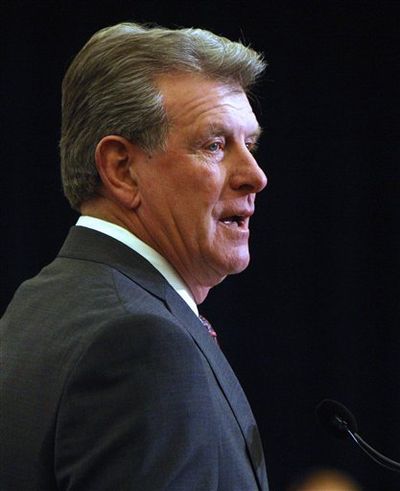Otter to lawmakers: Start where we agree

BOISE – Idaho Gov. Butch Otter took an upbeat tone in his sixth State of the State message to lawmakers today, urging them to start where they all agree and get things done for the state – including his proposal for Idaho to run its own health insurance exchange.
“Rejecting the opportunity to assert ourselves will result in an unresponsive, one-size-fits-all federal exchange wreaking havoc on some of America’s most reasonable costs of coverage,” Otter declared. “At its core, this is a matter of states’ rights.”
Lawmakers seemed largely pleased with the governor’s overall message, which included a proposed 3.1 percent increase in state spending next year, though state economists predict tax revenue will grow by 5.3 percent; issuing bonds to build a new $70 million secure mental health facility at the state prison complex; boosting school funding next year by 2 percent or $25.6 million; and adding $35 million to the state’s rainy-day savings account.
“At least he’s keeping his conservative perspective on increases for the state budget,” said an approving Rep. Vito Barbieri, R-Dalton Gardens – though Barbieri remains adamantly opposed to a state-based insurance exchange.
While proposing no base pay increases for state employees or teachers, Otter expressed optimism about the state’s economic outlook. “People have been hearing for four years about what we can’t do,” he said after his speech. “Let’s talk about what we can do.”
The governor called for collaborative efforts to come up with better school improvement plans after voters in November rejected the tech-heavy “Students Come First” reform laws; he put a $33.9 million placeholder in his proposed budget for next year to cover reforms on which both lawmakers and a stakeholder task force he’s pulling together agree.
“I am neither calling for nor expecting major school improvement measures this year,” Otter told lawmakers. “But I believe there are areas in which we can make progress, and I encourage you and all citizens to engage in that public discussion.”
Otter also floated a unique approach to the state’s current hot-button tax debate, over a call from Idaho’s biggest businesses to repeal the personal property tax on business equipment, which collects $141 million a year. He suggested allowing more local-option taxes in Idaho to offset the impact on local government services; he also tagged $20 million in his proposed budget to ease the transition for counties and other local governments.
Rep. George Eskridge, R-Dover, expressed concerns about that idea. “A local-option tax would be just a shifting of the tax burden from one segment to another, and I wouldn’t be in favor of that,” Eskridge said. “You’re still taking away the opportunity to fund existing county services. … The state needs to compensate for that.”
House Speaker Scott Bedke, R-Oakley, said it’s “an interesting proposal,” but said he still has questions about it.
The insurance exchange will be a big challenge for Otter to sell to some members of his own party, but he made a strong pitch for it Monday.
“You all know how I feel about Obamacare,” Otter told lawmakers. “But the fact remains that for now and for the foreseeable future, it is the law. And as responsible elected officials, we’re sworn to uphold the rule of law, not just those laws that we support.” That comment drew applause.
After his speech, Otter compared his stand on the exchange to his approach to federal proposals for protecting caribou habitat in North Idaho.
“They said we’ve got to have 375,000 acres for caribou habitat for four caribou,” Otter said. “If I had walked away,” that federal proposal might have stood, he said. Instead, after extensive negotiations, public input and political pressure, the protected habitat was shrunk to 6,000 acres. “But it was because we stayed at the table,” Otter said.
Otter cited the same approach in today’s 9th Circuit Court of Appeals upholding of Idaho’s roadless rule, a rule governing potential future wilderness area that former Gov. Jim Risch negotiated. Idaho is the only state that came up with its own rule, allowing it to opt out of then-President Clinton’s national roadless rule. “Because we stayed at the table, we get more decisions,” he said.
Bedke said, “There’s a lot of examples that the governor used where we have been very instrumental in making a federal law work for Idaho.” But he added, “Having said that, we have got a big new caucus, and I don’t want to get out in front of them on this issue.”
Bedke also noted the governor’s comment that Idaho’s health insurance rates are now among the nation’s lowest. “I think it’s incumbent upon us to do everything we can to see that that continues,” he said.
New Rep. Ed Morse, R-Hayden, who defeated former Rep. Phil Hart, R-Athol, in the May GOP primary, said of the governor’s message, “I thought it was good. … Legislators may have a slightly different take, but it certainly frames a lot of the issues.”
New North Idaho College President Joe Dunlap traveled to Boise to hear the governor’s message, which included a shout-out to NIC’s new grant-funded aerospace program; he came away encouraged. “There was an element of optimism there,” he said, “that we’re looking for some better days ahead with the economy picking up.”